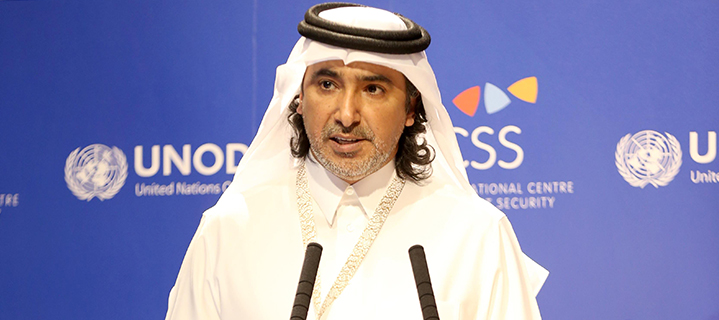Experts at ICSS-UNODC meeting call on governments to make match-fixing a global crime
Doha, Qatar; 15th April 2015:
Speaking at today’s ICSS-UNODC meeting at the UN Crime Congress, top experts from sport, government and finance have urged governments to introduce legislation that recognises match-fixing as a global crime.
To mark the opening of the event, a new partnership between the International Centre for Sport Security (ICSS) and the United Nations Office on Drugs and Crime (UNODC) was announced, which will see the two organisations work together to strengthen cross-border investigations and prosecutions into match-fixing and the manipulation of sports competitions.
Witnessed by H.E Abdullah bin Nasser bin Khalifa Al Thani (Prime Minister of the State of Qatar and Minister of Interior), the agreement between the ICSS and UNODC will be an important step towards governments recognising match-fixing as a global crime, which experts called for throughout the event.
Speaking on the opening panel, Lord Moynihan, Member of the British House of Lords and author of the UK Governance of Sport Bill said:
”The agreement between the ICSS and UNODC is exceptionally important. I think international cooperation and agreements like this one are vital but they are impeded without effective domestic legislation, which must be synchronised at an international level.
Whilst praising the Council of Europe Convention on the Manipulation of Sports Competitions, Moynihan added:
”We need the ICSS and UNODC to continue working with governments around the world to ensure best practice in delivering consistent national legislation to fight match-fixing and corruption in sport because, if it isn’t consistent, it will simply fail to address what is a global challenge.
Building on the findings of the Sorbonne-ICSS Report, which estimated that the size of the sport betting market is estimated to be between €800-900 billion, Patrick Jay, Independent Betting Expert and former Director of Trading at the Hong Kong Jockey Club, revealed that he estimated that the illegal sports betting market is now worth as much as US$1 trillion.
Simone Farina, Aston Villa FC Coach and former professional footballer, also spoke about his experiences as a player being approached to fix a match and called for sport, government and law enforcement to provide greater support to players and develop more programmes to inform athletes about the procedures in place to report sports-results manipulation.
Mohammed Hanzab, President of the ICSS, concluded:
”Match-fixing is a transnational issue that usually involves dozens of individuals across multiple jurisdictions. A country-by-country approach is simply not enough to combat this very real threat to sport.
”Today’s meeting and the ICSS’s new partnership with the UNODC will be an important step forward towards international legislation being passed by governments that recognises match-fixing as a global crime. Without this, new match-fixing cases will continue to surface and sport will remain under threat.
”As well as this, today’s ICSS-UNODC meeting also confirmed the real need for an international convention that facilitates the global exchange of data between countries and supports transnational investigations and prosecutions of match-fixing cases.
”At the ICSS, we are committed to working towards these two clear objectives and creating the right environment for law enforcement to eliminate the growing influence of organised crime in sport.

